
International Emergency Nursing
Scope & Guideline
Advancing emergency care through global insights.
Introduction
Aims and Scopes
- Emergency Care Practices:
Research focused on clinical practices in emergency departments, including triage methods, pain management, and the care of specific populations such as pediatrics, geriatrics, and mental health patients. - Quality Improvement Initiatives:
Studies aimed at enhancing the efficiency and effectiveness of emergency care services, including the implementation of new protocols, educational interventions, and assessment tools. - Workplace Well-being and Violence Prevention:
Explorations of workplace dynamics, including the effects of violence against healthcare workers and strategies to improve the mental health and resilience of emergency nursing staff. - Innovative Educational Approaches:
Research on new educational methodologies, including gamification and simulation training, to improve competencies among emergency nursing professionals. - Patient Experience and Advocacy:
Investigations into patient perspectives and experiences within emergency departments, emphasizing the importance of patient-centered care and advocacy in emergency nursing.
Trending and Emerging
- Gamification in Nursing Education:
The use of gamification techniques, such as murder mystery games, to enhance training and competencies among emergency healthcare professionals is gaining attention, reflecting a broader trend toward interactive and engaging educational methods. - Mental Health in Emergency Settings:
There is an increasing focus on the mental health needs of patients and healthcare workers in emergency departments, encompassing topics like mental health emergencies, workplace violence, and resilience among staff. - Technological Advancements:
Emerging themes include the integration of technology in emergency care, such as machine learning algorithms for risk stratification and telehealth applications, indicating a shift toward data-driven decision-making. - Patient-Centered Care Initiatives:
Research is increasingly emphasizing the importance of patient experiences in emergency care, including the acknowledgment of patient voices in decision-making and the development of patient-centered protocols. - Workplace Well-being Strategies:
There is a growing focus on workplace well-being, exploring strategies to mitigate burnout and enhance job satisfaction among emergency nursing staff, signaling a shift towards valuing healthcare provider mental health.
Declining or Waning
- Traditional Triage Methods:
As new triage education and technology emerge, traditional methods of triage assessment may be receiving less focus, with more emphasis on innovative approaches and tools. - Generalized Pain Management Strategies:
The focus on generic pain management practices is waning, as research increasingly targets specific populations or innovative, individualized strategies for pain relief. - Basic Emergency Care Protocols:
The exploration of basic emergency care protocols seems to be decreasing, likely due to a shift toward more complex, integrated care models that address the needs of diverse patient groups.
Similar Journals
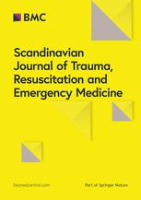
Scandinavian Journal of Trauma Resuscitation & Emergency Medicine
Shaping the Future of Resuscitation and Emergency MedicineThe Scandinavian Journal of Trauma Resuscitation & Emergency Medicine, published by BMC, stands as a leading open-access platform dedicated to advancing the fields of trauma, resuscitation, and emergency medicine since its inception in 2008. With an ISSN of 1757-7241 and an impressive track record, this journal has established itself in the top quartile of critical care and emergency medicine, achieving Q1 rankings in both categories for 2023. Its Scopus rankings further underscore its importance, placing it among the top 11 journals in emergency medicine and the 23rd in critical care and intensive care medicine, signaling a strong impact within the academic community. As we converge toward 2024, the journal continues to provide researchers, clinicians, and students with valuable access to cutting-edge research and developments in the sector, contributing significantly to knowledge, practice, and policy in emergency care. Located in the heart of the United Kingdom, the journal remains dedicated to its mission of fostering innovation and dissemination of high-quality research, ensuring that vital medical advancements reach those who need them most.
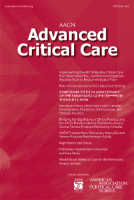
AACN Advanced Critical Care
Empowering healthcare professionals through innovative research.AACN Advanced Critical Care, published by the American Association of Critical-Care Nurses, serves as an essential resource in the field of critical care nursing and emergency medicine. With an ISSN of 1559-7768 and an E-ISSN of 1559-7776, this peer-reviewed journal is committed to advancing the knowledge and practice of critical care through rigorous research and innovative clinical insights. The journal holds a reputable position within its field, achieving a Q2 ranking in Critical Care Nursing and Emergency Medicine, alongside a Q3 ranking in miscellaneous Medicine categories for 2023. With a convergence of scholarly contributions from 2006 to 2024, it strives to explore the latest advancements and challenges in critical care environments, ensuring that its readership of researchers, healthcare professionals, and students are well-informed of emerging trends and best practices. The journal does not offer Open Access, however, its impact and relevance are evident from its Scopus rankings, which place it at a commendable #14 in Critical Care Nursing and #47 in Emergency Medicine. As a crucial platform for knowledge dissemination, AACN Advanced Critical Care plays a vital role in enhancing clinical effectiveness and improving patient outcomes in acutely ill populations.
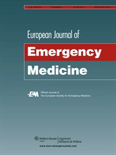
European Journal of Emergency Medicine
Pioneering Research for Life-Saving PracticesWelcome to the European Journal of Emergency Medicine, a premier publication dedicated to advancing the field of emergency medicine. Published by Lippincott Williams & Wilkins, this journal serves as a vital resource for researchers, practitioners, and students alike, delivering high-quality, peer-reviewed articles that reflect the latest advancements and best practices in emergency care. With its publication history dating back to 1994 and a projected convergence until 2024, the journal has established itself as an influential voice in the field, boasting a commendable Q2 ranking in Emergency Medicine as of 2023. The Scopus ranking further reinforces its prestige, placing it in the 73rd percentile among its peers. Although currently not an Open Access journal, the European Journal of Emergency Medicine remains committed to making critical knowledge accessible and impactful within the global medical community. We invite you to explore cutting-edge research, innovative studies, and key clinical insights that are essential for improving patient outcomes and advancing emergency medical practices.

Resuscitation Plus
Pioneering New Frontiers in Resuscitation and Emergency MedicineResuscitation Plus, published by Elsevier since 2020, is a leading open-access journal dedicated to advancing the fields of Cardiology and Cardiovascular Medicine, as well as Emergency Medicine and Emergency Nursing. Based in the Netherlands, this scholarly publication aims to disseminate high-quality research, reviews, and clinical practices that enhance patient care and outcomes in resuscitation and critical health situations. Achieving a notable impact factor with Q1 rankings in Emergency Medicine and Emergency Nursing, alongside Q2 in Cardiology, Resuscitation Plus holds a significant position in its respective categories. As an open-access journal, it provides widespread accessibility to vital research findings and discussions, inviting contributions from researchers, healthcare professionals, and academics alike. The journal not only fosters collaboration among the scientific community but also emphasizes the practical application of research to improve emergency health interventions. This convergence of expertise places Resuscitation Plus at the forefront of vital discussions in emergency healthcare.
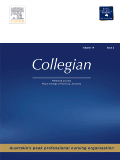
Collegian
Elevating Nursing Scholarship with Rigorous Insights.Collegian is a distinguished academic journal published by Elsevier, focusing on the dynamic field of nursing. Launched in 1994 and continuing through to 2024, it aims to contribute to the advancement of nursing knowledge and practice. With an ISSN of 1322-7696 and an E-ISSN of 1876-7575, this journal has achieved an impressive standing, securing a Q2 category ranking within Nursing (miscellaneous) and positioning itself at #49/139 in the general nursing category on Scopus, with a commendable 65th percentile. The journal provides a platform for both established researchers and emerging scholars to share innovative research, case studies, and reviews that shape nursing education and practice. Although not open access, it remains widely recognized for its rigorous peer-review process and substantial contributions to nursing literature. As the profession evolves, Collegian stands out as a pivotal resource for professionals, educators, and students who seek to enhance their understanding and application of nursing science.

Nephrology Nursing Journal
Pioneering Insights for Renal Health ProfessionalsNephrology Nursing Journal, published by Jannetti Publications, Inc, serves as an essential platform for the dissemination of cutting-edge research and practical insights in the field of nephrology nursing. With an ISSN of 1526-744X and an E-ISSN of 2163-5390, this journal ensures access to high-quality content for professionals dedicated to improving patient care in renal health. Since its inception in 2000, the journal has maintained its role in advancing the profession, as evidenced by its categorization in Q3 in Advanced and Specialized Nursing and Nephrology, as well as Q4 in Medicine (miscellaneous) for 2023. Although it does not currently offer Open Access, the journal still holds a significant position within the academic community, ranking #406 out of 636 in the broader field of General Medicine, reflecting its contribution to knowledge and practice in nephrology nursing. With an unwavering focus on improving nursing practices and patient outcomes, the Nephrology Nursing Journal continues to be a vital resource for researchers, educators, and healthcare professionals alike.
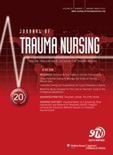
Journal of Trauma Nursing
Advancing Trauma Care Through Innovative ResearchJournal of Trauma Nursing, published by LIPPINCOTT WILLIAMS & WILKINS, is a pivotal resource in the fields of trauma, critical care, and emergency nursing. With an ISSN of 1078-7496 and an E-ISSN of 1932-3883, this journal has been at the forefront of disseminating cutting-edge research and innovative practices since its inception in 1995, continuing through 2024. Positioned within the Q3 quartile of the Advanced and Specialized Nursing, Critical Care Nursing, and Emergency Nursing categories, it provides valuable insights into trauma care that enhance clinical practice and patient outcomes. The journal is recognized for its commitment to advancing knowledge and improving the quality of nursing care, making it an essential publication for researchers, practitioners, and students who are dedicated to the fields of trauma and emergency nursing. While currently not available as Open Access, it remains a reputable source of peer-reviewed content aimed at fostering a comprehensive understanding of trauma nursing. Located in the United States at TWO COMMERCE SQ, 2001 MARKET ST, PHILADELPHIA, PA 19103, the Journal of Trauma Nursing continues to impact the profession significantly.
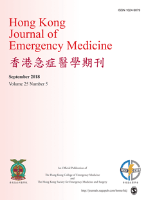
Hong Kong Journal of Emergency Medicine
Connecting Research and Practice in Critical CareThe Hong Kong Journal of Emergency Medicine, published by WILEY, stands as a vital resource in the field of Emergency Medicine since its inception in 2004. With a commitment to advancing clinical practice and research, this open access journal—transitioned to open access in 2018—facilitates the dissemination of crucial knowledge among healthcare professionals and researchers, fostering a collaborative environment for addressing urgent medical challenges. The journal boasts an impressive impact factor and holds a Q2 ranking in the Emergency Medicine category for 2023, reflecting its significance and influence within the academic community. Located in Hong Kong, this journal aims to explore a broad spectrum of topics related to emergency and critical care, making it an essential publication for those seeking to enhance their understanding and practice in this fast-evolving field. Accessible through ISSN: 1024-9079 and E-ISSN: 2309-5407, it promises to be an invaluable asset for researchers, practitioners, and students alike.
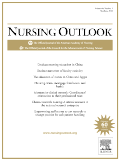
NURSING OUTLOOK
Empowering Nursing Practices with Pioneering ResearchNURSING OUTLOOK is a premier academic journal published by Elsevier Science Inc, dedicated to advancing the field of nursing and healthcare through high-quality research and discourse. Since its inception in 1953, this esteemed journal has provided a vital platform for sharing significant findings and innovations in nursing practices, policy, and education. With an impressive impact factor and a distinguished position in the Q1 category for Nursing (miscellaneous), NURSING OUTLOOK ranks #10 out of 139 in the Nursing General category, showcasing its contribution and authority in the field with a remarkable 93rd percentile ranking in Scopus. Researchers, professionals, and students are encouraged to engage with the journal's comprehensive scope that encompasses contemporary issues and trends in nursing, fostering a deeper understanding and improved patient care practices. Although open access options are not available, the journal remains committed to disseminating critical scholarship within the nursing community and beyond, inviting submissions that challenge existing paradigms and contribute to future health care developments.
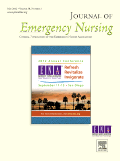
Journal of Emergency Nursing
Transforming Acute Care with Cutting-Edge ResearchJournal of Emergency Nursing, published by Elsevier Science Inc, serves as a premier platform for advancing the field of emergency nursing. Since its inception in 1975, this peer-reviewed journal has established itself as a vital resource for researchers, practitioners, and educators alike, with a notable impact factor and current ranking of #8 out of 32 in the Emergency Nursing category, placing it in the 76th percentile. The journal's commitment to the dissemination of high-quality evidence, innovative practices, and essential insights makes it an indispensable tool for those seeking to excel in acute care settings. Although not open access, the Journal of Emergency Nursing is dedicated to fostering knowledge and improving patient outcomes through robust research and comprehensive reviews, aligning closely with its mission to enhance emergency nursing practices and education through every issue until 2024 and beyond. For professionals and students keen on staying at the forefront of emergency care advancements, this journal provides a wealth of knowledge and resources, reflecting the critical issues and developments shaping the future of healthcare.